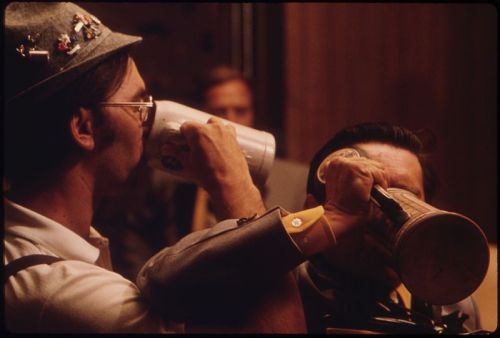Raw Story: The Association of German Breweries sent a letter this week to German Prime Minister Angela Merkel and six Cabinet Ministers demanding a moratorium on fracking until more research can be carried out to allay concerns of water contamination.The Reinheitsgebot is one of the earliest consumer protection laws, preventing brewers from charging premium beer prices for crap. Contrary to the article, it doesn’t apply to all beers, just most Bavarian lagers — wheat beers like Paulaner’s are obviously legal. Still, unknown fracking chemicals in the water could be seen as violating the standards — you don’t want that crap in your Spaten.
Germans have had strict standards for beer brewing since the 1516 implementation of the Bavarian “Reinheitsgebot,” or purity law, which allowed only malted barley, hops and water to be used in the brewing of beer. (Yeast was allowed later, after it was discovered.) But the strict nature of the law, which remains in effect today, means that no additives of any kind are allowed — especially contaminants in the drinking water.
The breweries association spokeperson, Marc-Oliver Huhnholz, told Bloomberg, “We are concerned that fracking endangers the brewing water that more than half of Germany’s breweries take from private wells.” He explained to The Telegraph, “The water has to be pure and more than half Germany’s brewers have their own wells which are situated outside areas that could be protected under the government’s current planned legislation on fracking.”
Merkel’s coalition in government, which includes Germany’s two mainstream conservative parties, reportedly plans to offer fracking legislation before the September 22, 2013 elections that would allow fracking in some areas but not in others. The main opposition party, the Social Democrats, support a moratorium and the Green Party prefers an outright ban on the practice. The head of the Green Party in parliament, Bärbel Höhn, told Das Bild in January, “Fracking with toxic chemicals is prohibited. But the government wants to allow it in 86 percent of the region. That makes more than just the brewers concerned.”
What this story does is demonstrate how one industry impacts another. When you start carving out exceptions to law to benefit one industry, you often wind up injuring another. And, of course, fracking is a stupid idea anyway, since it risks earthquakes — in addition to the pollution that results in flammable tapwater.
[photo via Wikimedia Commons]






